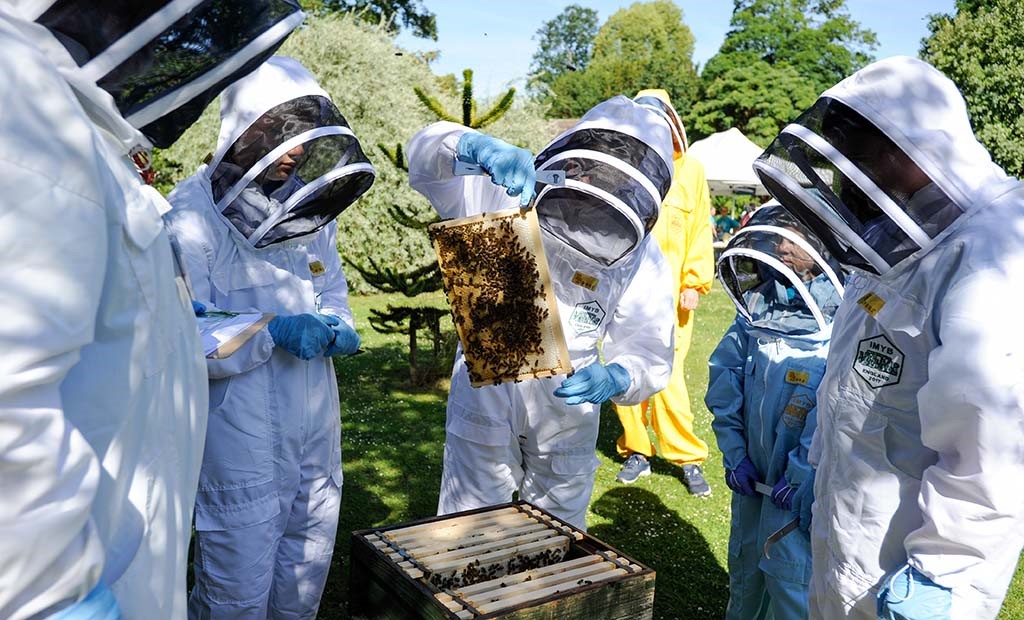Our children are the beekeepers of the future. But given the commotion caused by an unexpected buzz in the classroom, getting them there may take a good deal of encouragement! With many bee species under threat, it is essential we show children how amazing these creatures can be.
The basics of bees
Bees are more complex than you might expect. For the past 27 million years, they have been essential for sustaining life on earth. In their quest for pollen and nectar, they fertilise flowers, fruits and vegetables and enable them to grow.
Of the 250 species of bee in the UK, only the honeybee actually makes honey. The majority of honeybees are kept by beekeepers in collections of hives known as apiaries. Other species, such as bumblebees and solitary bees, live in the wild. You can spot a honeybee by its thin, wasp-like appearance. Being managed by beekeepers makes honeybees the most easily accessible bee species to help with education.
Working nine to five
People don’t say ‘busy bee’ for nothing! Most bees spend their days cleaning, building and foraging. Others work as hive guards, allowing only those from their own colony inside. Predators such as wasps or hornets could wreak havoc if permitted to enter.
A colony of honeybees works together to support its queen. Her role is to lay the eggs that will become the next generation. These eggs are carefully nurtured by the colony until they develop into larvae. With all these tasks to perform, it’s no wonder honey bees are known as ‘workers’. For the first three weeks, the worker bees do the housekeeping, nursing, prepare the food, along with many other roles before becoming foragers for the last three weeks of their lives.
Bees at risk
Most of us know that pollinators are in decline. According to Friends of the Earth ‘35 UK bee species are under threat of extinction, and all species face serious threats’. These losses have been linked to intensive agriculture, parasites and the risks associated with climate change.
While these threats undeniably place honeybee colonies under increased stress, they are not currently in danger of extinction.
How your school can help bees
Jenny Morgan, trustee at the British Beekeepers Association (BBKA), a charity aiming to raise the profile of beekeeping among young people, explains what the PTA can do:
• Get bees on the curriculum
From biology to history, there is scope to include bees across a range of subjects. The BBKA provides teaching resources for KS1 and KS2 to help teachers integrate bees into classroom learning. Ask your school how they can incorporate bees into lessons.
• Invite a beekeeper to speak in assembly
Local beekeepers are often happy to share their knowledge with schools. Find your local beekeeping association: British Beekeepers Association (BBKA) and Scottish Beekeepers’ Association (SBKA).
Remember, beekeeping is seasonal. From April onwards, a beekeeper might be able to bring in an observation hive. This would enable the children to see the bees from behind a sealed pane of glass.
• Visit the BBKA Educational Apiary
Suggest your school makes a beeline for the BBKA’s educational apiary located in Warwickshire if they are within reasonable travelling distance. The apiary is free for schools to visit and is open to a maximum of 30 pupils at a time. With plenty of opportunities to ask questions and get involved, it’s an interactive day where the pupils can work together – just like a colony of bees. For further details see the BBKA website: https://www.bbka.org.uk/Pages/Category/school-visits
• Set up beehives in school
Work with the school to keep bees on site. It can be rewarding for the whole school community when done with care and attention. At Heron Hill Primary School in Cumbria, one of the BBKA’s Beacon Schools, teachers report that caring for bees has helped pupils build confidence. The beekeeping rota is so popular, it is almost always full.
Beekeeping might sound daunting, but the BBKA has a wealth of online guidance and a YouTube channel packed with practical videos.
• Enrol students in the Junior Beekeeping Certificate
If you decide to set up beehives at your school and the school joins as a member of the BBKA, then pupils can complete the BBKA Junior Certificate in Beekeeping. Pupils earn a formal qualification and get the chance to meet fellow bee enthusiasts.
• Organise some bee-friendly activities
If investing in beehives isn’t an option for your school, there are other practical activities you can try:
Develop a bee-friendly wildflower patch. Try Suttons Seeds for wildflower mixes at a reasonable price.
Run a bee hotel building session. Solitary bees – those which do not have a colony – need somewhere to live, and bee hotels are the perfect solution. They are simple to make, even for young children, and help make your school a more bee-friendly environment. This handy guide from the Eden Project shows you how to make a bee hotel from a plastic bottle.
Bees and PTA fundraising
Supporting bees doesn’t have to cost the PTA money. In fact, you can raise funds by holding a bee-themed fundraiser:
• Honey is money
If you have hives at school, sell your honey at PTA events. Extracting honey is fun, and the children can, literally, get stuck in. Children who are less comfortable around bees can design labels or help bake honey cakes and biscuits.
Alternatively, work with a local beekeeper and sell their honey for a mark-up.
• Candle making
Buy wax in bulk and hold a candle making afternoon. Older children and adults can have a go at candle dipping – repeatedly lowering a wick into molten wax to build a candle. Younger age groups will enjoy rolling sheets of wax into candles.
• Pollinator bingo
Create a list of bees and other pollinators, and sell ‘pollinator bingo cards’ for a pound. Children can have loads of fun identifying different types of bees (the ‘What bee is this?’ page on the BBKA website will be helpful for this) and crossing them off, as well as keeping their eyes peeled for bats, hummingbirds and anything else on their card. A pollinator scavenger hunt is a similar idea, charging a pound for each entry and getting children to list the pollinators they’ve seen, along with the date and location.






